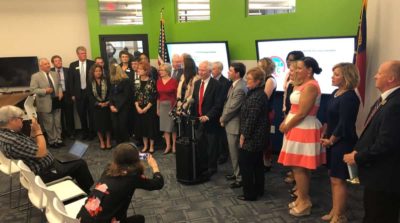Physical and mental health are critical to children’s educational attainment, to their success in the workplace, and to the future prosperity of North Carolina.
Governor Cooper’s goal of making North Carolina a Top 10 Educated State by 2025 aligns with efforts to establish an educational attainment goal for North Carolina and with the importance of addressing children’s physical and mental health and well-being. To be Top 10 means increasing access to and enrollment in quality early education; increasing the percentage of North Carolina students who graduate from high school, and increasing the percentage of North Carolina adults with a postsecondary degree or credential. Each of these will lead to a better educated and more prosperous North Carolina.
Governor Cooper’s Top 10 Educated State goals also align with the myFutureNC Commission’s plan to develop an educational attainment goal that all education systems in North Carolina would strive to reach. Focusing on health throughout every phase of a young person’s – and then adult’s – development is critical to the success of such a goal.
To accomplish any of these to the fullest extent requires support for students’ positive physical and mental health. Students also must feel safe and supported in school. Whether short-term or ongoing, children who experience trauma stemming from hunger, abuse, neglect, depression, anxiety, fear, or other circumstances, face greater challenges to learning effectively and achieving to their potential, academically and socially.
Addressing children’s multi-faceted needs can happen in many ways. Here are a few:
- School nurses, counselors, social workers and psychologists provide vital services for school children, especially those experiencing trauma. There is consensus about the critical role these professionals play, yet North Carolina is far below the staffing levels needed. These trained professionals should be available regularly in every school building to ensure that problems are identified and that timely, appropriate support is provided.
- A comprehensive and effective approach to school safety is also a must. This starts with promoting a positive school climate for all students, and teaching students and teachers alike what that means. It is not academics alone that lead to post-secondary attainment; students who have a positive pre-K-12 experience are more likely to pursue post-secondary education.
- Focus on what works. While we should always be open to new ideas, existing research has much to say about promising and proven strategies for children’s positive mental health. The important and growing work on trauma-informed and trauma-sensitive schools is one example of an evidence-based, cost-effective approach — and an increasing number of North Carolina schools are participating. To summarize the experts, becoming trauma-informed and trauma-sensitive requires understanding, training, planning, and coaching. Our state will benefit as more students have access to educators and other professionals who understand the impact trauma can have on students’ health and well-being.
There are other effective, evidence-based approaches such as Youth Mental Health First Aid, peer counseling, anti-bullying initiatives, and building social and emotional skills and resilience. Supporting students’ positive physical and mental health and well-being is essential for North Carolina students to achieve success in education from the earliest years through post-secondary educational attainment.
Editor’s note: This perspective was originally published by The Hunt Institute. It has been posted with the author’s permission.





